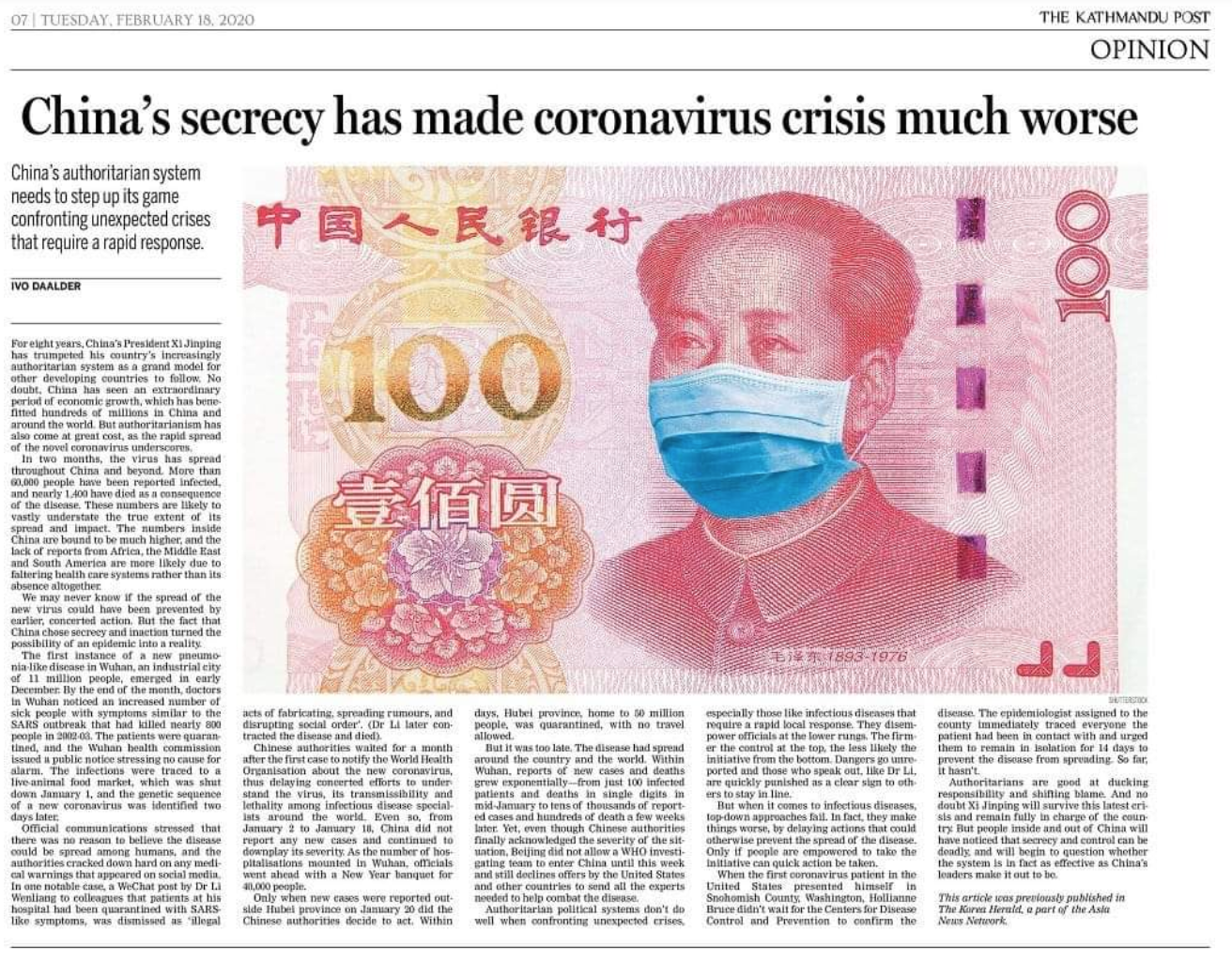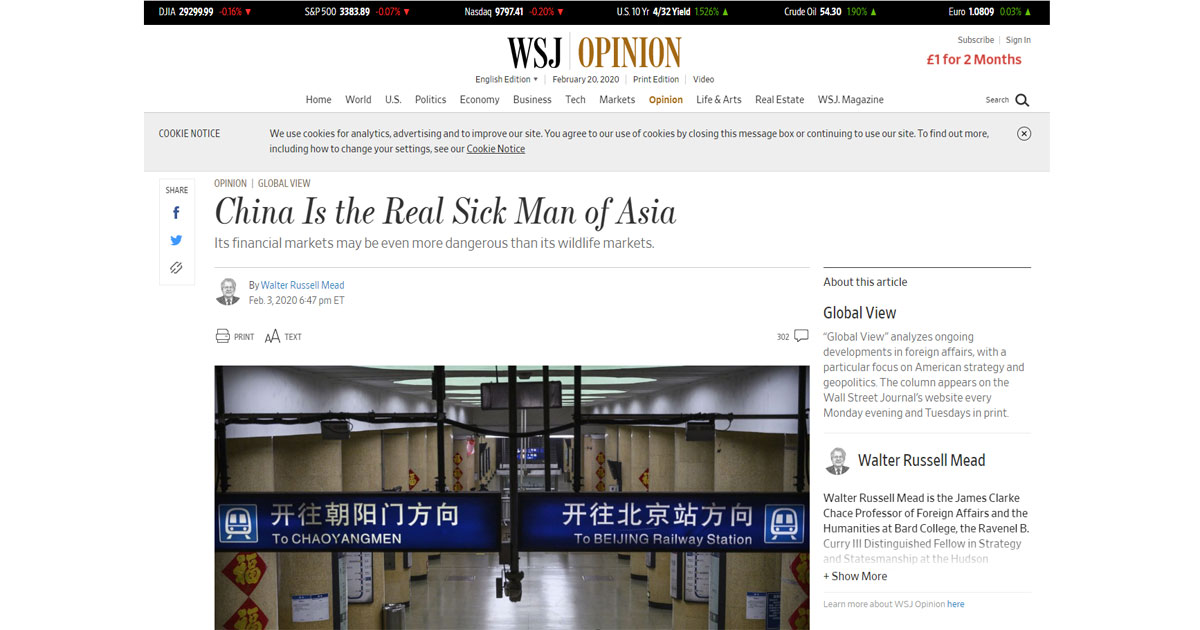China has expelled three Beijing-based Wall Street Journal (WSJ) journalists from China last week.
A WSJ op-ed headline that called China the "real sick man of Asia", had angered the waking dragon.
Writer defended himself
The op-ed, written by American foreign affairs expert Walter Russel Mead, focused on the vulnerable condition of China's financial markets in times such as the current Covid-19 outbreak.
Mead has since posted a tweet which appeared to be an attempt to absolve him of responsibility with regard to the headline in question.
Apropos of nothing in particular, a word to my new Chinese followers: at American newspapers, writers typically do NOT write or approve the headlines. Argue with the writer about the article content, with the editors about the headlines.
— Walter Russell Mead (@wrmead) February 9, 2020
Expelled reporters nothing to do with op-ed
The three expelled journalists were not linked to the commentary in any way, as was the practice in many newsrooms and editorial departments.
But they were ordered to leave within five days from Feb. 19.
Expulsion a rare move
China had demanded an official apology from WSJ, which had refused to do so.
WSJ also pointed out that the expulsion of multiple journalists from the same establishment was the first time in the post-Mao era, making it an extremely rare decision.
Beijing's decision to revoke the press credentials from the three WSJ foreign correspondents came hours after the United States declared five Chinese state media outlets as arms of the Chinese government.
Previously in August 2019, a Singaporean WSJ journalist was expelled from China as well for a report on the allegations regarding the illegal activities of Chinese President Xi Jinping's cousin in Australia.
WSJ journalists also called for an apology
The New York City-based newspaper has since expressed "regret" over the headline, but continued to stand its ground, choosing not to apologise or amend it.
The paper remained unmoved even after as many as 53 WSJ reporters and editors, mostly from its China bureau, sided with Beijing, calling for the top management of the paper's parent companies, such as Dow Jones, to "consider correcting the headline and apologising" to readers and "anyone else who was offended by it", The Washington Post reported.
WSJ's Editor in Chief Matt Murray further wrote in a note to staff that the paper would continue its coverage on China, "without fear or favour and with no agenda but the truth".
U.S. condemns the expulsion
Mike Pompeo, the U.S. Secretary of State, had condemned China's decision to expel the journalists.
The United States condemns the move by China to expel three @WSJ journalists. Mature, responsible countries understand that a free press reports facts and expresses opinions. China should not restrict #freespeech. https://t.co/szm0ujq2Ua
— Secretary Pompeo (@SecPompeo) February 19, 2020
While Beijing's move had sparked speculation on its true intentions, the incident appeared to be yet another episode of external organisations getting caught up in the rising tensions and deepening rivalry between the U.S. and China.
Why are the Chinese offended?
The phrase "sick man of Asia" emerged as a parallel to the original "sick man of Europe", which was used by Tsar Nicholas I in 1853 to describe the declining Ottoman Empire.
"Sick man of Europe" was later used to describe several European countries which were going through times of economic difficulty, such as the United Kingdom in the 1960s and 1970s, Germany in the 1990s and the early 2000s, Italy and Portugal in the 2000s, Greece in 2008 and 2009, and Finland in 2015 and 2016.
As for the phrase "sick man of Asia", it was first used to describe China in the 19th and 20th century -- a time when the country was torn apart by internal divisions, and humiliated by foreign powers when it was forced to sign "unequal treaties" which opened its ports to powers such as Great Britain and the Empire of Japan.
Many Chinese find the phrase to be highly offensive as they perceive it as a racial slur, according to Financial Times correspondent Yuan Yang.
https://twitter.com/YuanfenYang/status/1230131389334310912
China condemns another foreign paper
China had also taken issue with an illustration for an op-ed on major Nepalese daily The Kathmandu Post shortly after the decision to expel the WSJ journalists.
The Chinese embassy in Kathmandu condemned the illustration that depicted a mask-wearing Mao Zedong on the 100-yuan banknote.
 Image via The Kathmandu Post
Image via The Kathmandu Post
The newspaper, however, had doubled down, slamming Beijing in an editorial for trying to suppress free speech.
If you like what you read, follow us on Facebook, Instagram, Twitter and Telegram to get the latest updates.
